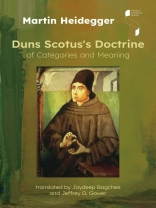Duns Scotus’s Doctrine of Categories and Meaning is a key text for the origins of Martin Heidegger’s concept of 'facticity.’ Originally submitted as a postdoctoral thesis in 1915, it focuses on the 13th-century philosopher-theologian John Duns Scotus.
Heidegger first analyzes Scotus’s doctrine of categories, then offers a meticulous explanation of the Grammatica Speculativa, a work of medieval grammar now known to be authored by the Modist grammarian Thomas of Erfurt. Taken together, these investigations represent an early foray into Heidegger’s lifelong philosophical concerns, 'the question of being in the guise of the problem of categories and the question of language in the guise of the doctrine of meaning.’
This new and unique translation of one of Heidegger’s earliest works offers an important look at his early thinking before the question of being became his central concern and will appeal to readers exploring Heidegger’s philosophical development, medieval philosophy, phenomenological interpretations of the history of philosophy, and the philosophy of language.
Spis treści
Translator’s Preface
Acknowledgments
Foreword to the First Edition of Frühe Schriften (1972)
Duns Scotus’s Doctrine of Categories and Meaning Foreword
Introduction: The Necessity of Examining Scholasticism from the Perspective of the History of Problems
Part I: The Doctrine of Categories
First Chapter: The Unum: Mathematical, Natural, and Metaphysical Reality
Second Chapter: The Verum: Logical and Psychic Reality
Third Chapter: Linguistic Form and Linguistic Content: The Domain of Meaning
Part II: The Doctrine of Meaning
First Chapter: Meaning and Meaning Function: Principles of the Doctrine of Meaning
Second Chapter: The Doctrine of the Forms of Meanings
Conclusion: The Problem of Categories
Author’s Notice
Bibliographical References
Editor’s Afterword
English-German Glossary
German-English Glossary
Index of Names
Subject Index
O autorze
Joydeep Bagchee is the author of The Nay Science: A History of German Indology and Philology and Criticism. He specializes in German and Indian philosophies. He lives and teaches in Berlin. Jeffrey D. Gower is Byron K. Trippett Assistant Professor of Philosophy and Philosophy, Politics, and Economics at Wabash College. His research focuses on questions of sovereignty, economy, and ecology in Agamben, Derrida, Heidegger, and Aristotle.












